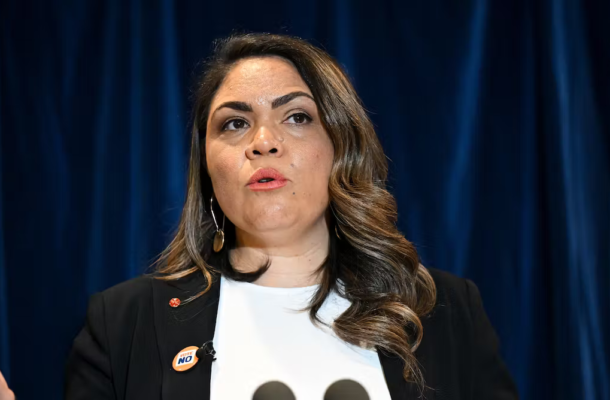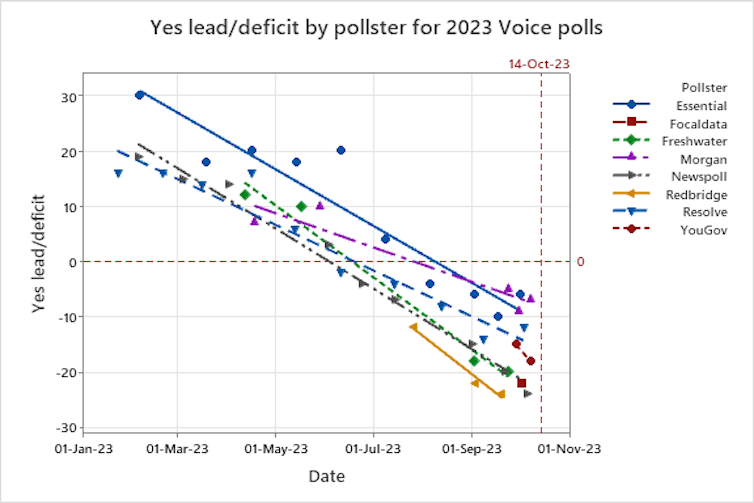The final countdown

The referendum on the Indigenous Voice to parliament will be held on Saturday. Polls close at 6pm AEDT in the south-eastern states, 6:30pm in South Australia, 7pm in Queensland, 7:30pm in the Northern Territory and 9pm in Western Australia.
For a referendum to succeed, it requires a majority in at least four of the six states as well as a national majority. Polling suggests there is no realistic chance of a national “yes” majority, so the double majority is a moot point.
The graph below has been updated with the inclusion of national Voice polls from YouGov, Morgan and Focaldata (see below).

The Voice polls range from a six and seven point “no” lead in Essential and Morgan to a 22 and 24-point “no” lead in Focaldata and Newspoll. So the most optimistic case for “yes” is a loss by high single digits, but the actual loss is likely to be higher.
Labor’s lead widens in federal Resolve poll
I previously covered the 56–44 lead for “no” in the national Resolve poll for Nine newspapers that was conducted September 22 to October 4 from a very large sample of 4,728.
Primary votes in this poll were 37% Labor (up one since early September), 31% Coalition (down three), 12% Greens (steady), 7% One Nation (up two), 2% UAP (steady), 9% independents (steady) and 2% others (steady).
Resolve does not give a two party estimate until near elections, but applying 2022 election preference flows to this poll gives Labor a 57–43 lead, a 1.5-point gain for Labor since September. During this term, Resolve has easily been Labor’s most favourable pollster.
Anthony Albanese’s net approval improved seven points to net zero, with 43% saying he had done a good job and 43% a poor job. Peter Dutton’s net approval fell seven points to -15. Albanese led Dutton by 47–25 as preferred PM, out from 43–28 in September.
The Liberals retained a narrow 35–33 lead over Labor on economic management, in from 36–30 in September. On keeping the cost of living low, Labor led by 31–27, reversing a Liberal lead of 28–27 in September.
Federal questions other than voting intention and the Voice referendum were based on the normal sample of 1,600 respondents. Additional Voice questions below are based on a sample of over 3,100.
Further Resolve Voice questions
Among “no” voters, 33% cited dividing the country by race as the most persuasive “no” argument, while 16% selected not enough detail. Among “yes” voters, 19% cited a practical way to recognise Indigenous people in our Constitution as the most persuasive “yes” argument.
By 49–20, voters thought the Voice would create waste and inefficiency rather than reduce it. By 38–23, they thought colonisation had had a positive rather than negative impact on Indigenous Australians.
Based on a subsample of 420 Indigenous respondents from the full sample of 4,728, “yes” led by 59–41 among Indigenous people. This is down from 80% support for “yes” among Indigenous respondents in surveys by other pollsters conducted early this year.
In other demographic breakdowns, “no” led with religious voters by 64–36, while “yes” led with the non-religious by 53–47.
Full results of this Voice poll can be downloaded from the Resolve website. Self-identified progressives supported “yes” by 75–25, while conservatives supported “no” 78–22. The killer for “yes” is that those who took neither view supported “no” by 66–34. There are similar findings in a Focaldata poll.
YouGov poll: ‘no’ leads by 56–38
A YouGov national poll, conducted October 6–10 from a sample of 1,519, gave “no” to the Voice a 56–38 lead, out from 53–38 in the previous YouGov poll in late September. YouGov used to conduct Newspoll, but is now producing its own polls.
On voting intentions, Labor led by an unchanged 53–47, from primary votes of 36% Coalition (up one), 33% Labor (steady), 14% Greens (up one), 6% One Nation (not listed in September) and 11% for all Others.
Albanese’s net approval was steady at -3, while Dutton’s was up five points to -12. Albanese led Dutton by 50–34 as preferred PM (50–33 previously). By 41–39, respondents said they would support a constitutional change to make Qantas a publicly owned company.
Morgan poll: ‘no’ leads by 51–44
A national Morgan Voice poll, conducted October 2–12 from a sample of 1,419, gave “no” to the Voice a 51–44 lead (a 46–37 “no” lead in late September). Initial preferences were 46% “no” (steady), 40% “yes” (up three) and 14% undecided (down three). Undecided were then asked how they were leaning. Morgan predicts a 54–46 “no” vote by allocating two-thirds of remaining undecided to “no”.
Morgan’s weekly federal poll this week gave Labor a 53–47 lead, a one-point gain for Labor since last week. Primary votes were 34% Coalition, 33% Labor, 13.5% Greens and 19.5% for all Others. This was taken October 2–8 from a sample of 1,378.
Focaldata poll: ‘no’ leads by 61–39
A poll by British pollster Focaldata had “no” leading by 61–39. Focaldata used multi-level regression with post-stratification (MRP) to predict that 22 of the 151 electorates would support “yes”; these “yes” seats are inner city seats. This poll was conducted September 18 to October 2 from a sample of 4,608.
This article was published by The Conversation.
Adrian Beaumont is an Honorary Associate in the School of Mathematics and Statistics at The University of Melbourne. He has written poll and electoral analysis articles for The Conversation since the 2013 Federal election.













